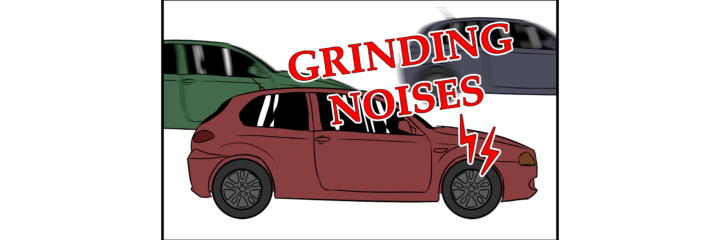Wear and tear of machine parts components are inevitable. Over time, you will start hearing squeaking, grinding, scraping, and other sounds from these machine parts. Braking components, like most machine parts, will also wear out over time.
If you hear grinding noises when you press on your brake pedal or slow down, then your brake pad or an absence of pad materials is to blame. Is this something you should be worried about? Yes, don’t ignore the grinding noise you get from your brakes at low speed.
While you can still drive the car that way for a while as the brake is not yet completely worn out, that’s not a very smart decision as the brakes are already compromised. It is something you should avoid doing especially because you are not sure of the severity of the damage. So, you’d be compromising your safety by putting off the repairs and keep driving the vehicle in such conditions.
Now, let’s take a quick look at the possible factors responsible for the grinding noise from your brake pedal.
1. Leaving Your Car in Storage for Too Long
Leaving your car unused for a long time, especially in bad weather conditions will aid the rusting of the braking system. So, don’t be surprised when you get back from vacationing and break out your car from storage, and suddenly you are hearing grinding noises when you try to slow down or stop the car.
If you can help it, take your car out from time to time for a ride even if it’s just for short distances, and then return it to storage. This will help reduce rust and keep the braking system in good shape. If you can’t walk your dog because you’re not around, there’s always a trusty friend or neighbor who can help you out, right?
2. Worn Out Brakes and Shims
The grinding noise your brakes make when you press on your brake pedal is an indication that your brakes or shims are worn down. At this point, the absence of pad materials in the brake will force the pads and rotors to grind against each other, metal to metal. You will need to replace the brakes at once or risk greater expenses that will require you to also replace your car’s CPR (calipers pads and rotors).
3. Insufficient Lubrication of Braking System
Moving mechanical parts need to be properly lubricated to function optimally. Insufficient Lubrication of braking parts like the caliper bolts will cause your brakes to make grinding noises. If this is the case, you will need to replace and lubricate the bolts.
4. Low-Quality Braking Parts
Choosing to purchase low-quality replacement brake pads may seem like a win-win at first, but it may cost you significantly more in the long run, expenses you didn’t “bargain” for. It’s always smarter to avoid low-quality brake pads and save your vehicle and your wallet from avoidable expenses in the future.
5. Clogs
Braking components are constantly exposed to all sorts of detritus on the road. These litters and potential clogs like debris, gravels, mud, dirt, and water could get stuck between the rotor and calipers causing grinding noises. It’s important to have it checked and taken care of right away to avoid more damages.
To Recap
In the long run, it’s isn’t more convenient to put off taking your car in for repairs the moment you’re hearing grinding noises from the brakes. Your safety and that of your passengers are even more important than the possibility of spending more on avoidable repairs in the future. Avoid driving cars with compromised brakes until the severity of the damage is determined and fixed.
The grinding noise won’t go away; it will only get worse. In time, the noises will graduate from grinding to thumping as the worn-out shims spiral into other issues compounding your problem. You will spend more on repairs if you eventually have to replace the CPR (calipers, pads, and rotors) of your car. Talk to your automobile mechanic as soon as possible.


